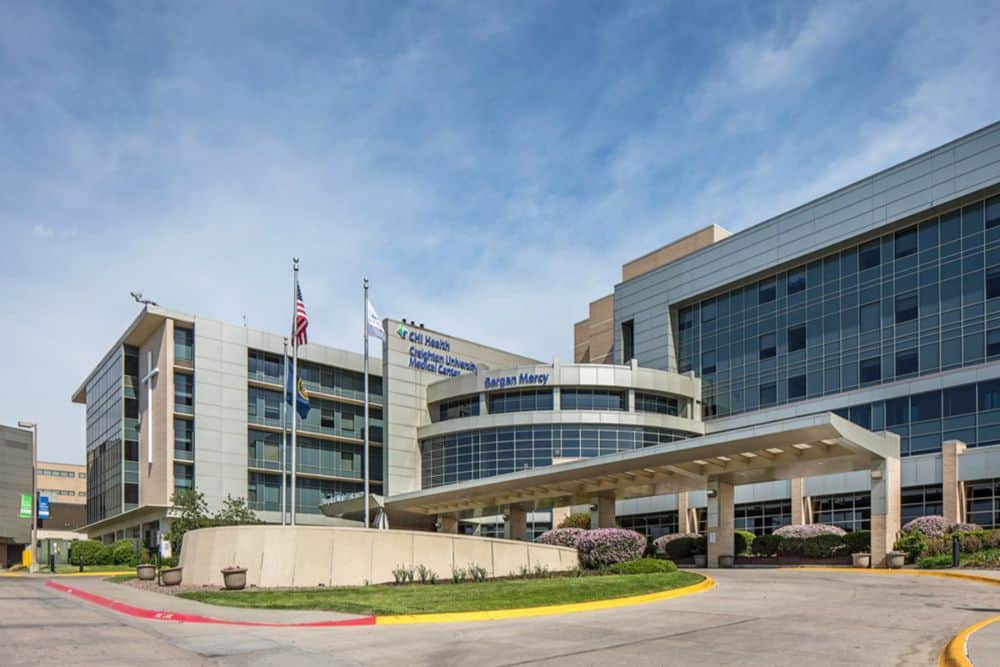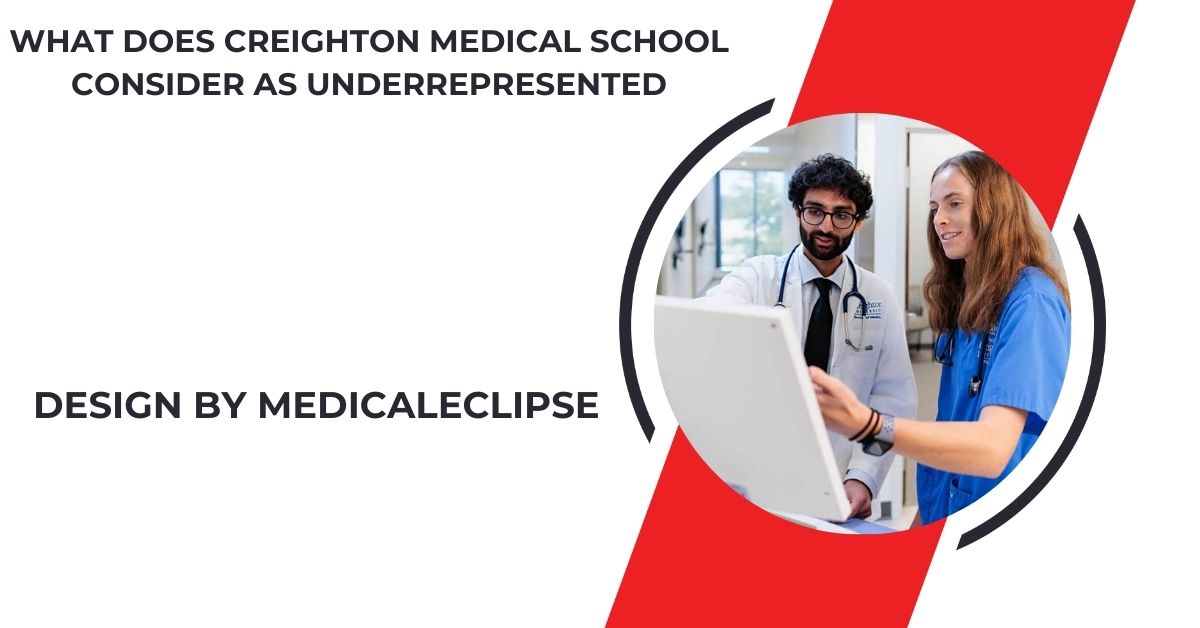Creighton Medical School considers underrepresented groups as racial minorities, low-income backgrounds, first-gen students, rural communities, and LGBTQ+ individuals
In this article, we’ll discuss what Creighton Medical School considers underrepresented, why this focus is important, and how the school supports its diverse students.
Understanding “Underrepresented” in Medical Schools:

In medical education, the term “underrepresented” refers to racial and ethnic groups that are disproportionately low in numbers within the field of medicine compared to the general population.
According to the Association of American Medical Colleges (AAMC), underrepresented minorities in medicine include individuals from certain racial and ethnic backgrounds who are underrepresented relative to their presence in the U.S. population.
Medical schools use these guidelines to determine who is considered underrepresented and to ensure they’re actively seeking diverse candidates.
What Creighton Considers as Underrepresented:
Creighton University aligns with the AAMC’s definition but also has its unique perspective on diversity, shaped by its Jesuit values and commitment to social justice. Here are key demographics and backgrounds that Creighton considers underrepresented:
Racial and Ethnic Minorities:
Individuals who identify as African American, Hispanic or Latino, Native American, and certain Asian subgroups are underrepresented in medicine. Creighton looks for applicants from these groups, as they bring unique perspectives and experiences valuable to the medical profession.
Also Read: Medication That Can Only Go In Checked Luggage – Traveling with Medications!
Socioeconomically Disadvantaged Backgrounds:
Candidates from lower-income or socioeconomically disadvantaged backgrounds are also considered underrepresented. Financial hardship and limited access to resources are significant barriers for many aspiring physicians, and Creighton recognizes the importance of supporting these individuals in their pursuit of a medical career.
First-Generation College Students:
First-generation college students often face unique challenges and limited access to networks within higher education. Creighton values these students for their perseverance and aims to increase their representation in medicine.
Rural and Underserved Communities:
Applicants from rural areas or medically underserved communities are also a focus for Creighton Medical School. Many rural and underserved areas experience physician shortages, and students from these areas are more likely to return to practice there after their training.
LGBTQ+ Students:
Creighton University also considers LGBTQ+ individuals as underrepresented in medicine. LGBTQ+ individuals face distinct health care challenges, both as patients and as members of the medical field. By fostering inclusivity for LGBTQ+ students, Creighton aims to improve patient care and promote understanding of LGBTQ+ health issues.
Why Diversity Matters at Creighton Medical School:

Creighton Medical School places a high value on diversity, not only for the richness it brings to its academic environment but for its impact on health care as a whole. A diverse student body helps to:
Enhance Patient Care:
Doctors who understand diverse cultural and socioeconomic backgrounds are better equipped to provide patient-centered care. Medical students with varied life experiences are more sensitive to the social determinants of health that impact their patients.
Promote Health Equity:
Health disparities continue to exist in the U.S., with people from underrepresented groups often receiving lower-quality care. By training a diverse set of future physicians, Creighton Medical School aims to reduce these disparities and improve health outcomes.
Address Physician Shortages in Underserved Areas:
Students from underserved communities are more likely to return to those areas as physicians, helping address the physician shortage and ensuring that vulnerable populations have access to quality care.
Encourage Innovation and Collaborative Learning:
A diverse group of students brings fresh perspectives and ideas to the classroom. This variety in viewpoints fosters critical thinking, collaboration, and innovation—essential qualities in medical practice.
Creighton’s Support for Underrepresented Students:
Creighton Medical School has developed a variety of programs and initiatives to support its underrepresented students:
- Mentorship Programs:Mentorship plays a crucial role in medical school success. Creighton offers mentorship opportunities that connect students from underrepresented backgrounds with faculty and professionals who provide guidance and support.
- Scholarships and Financial Aid:Creighton provides scholarships specifically for underrepresented students to help ease financial barriers. This funding ensures that financial challenges do not stand in the way of promising medical students.
- Student Organizations and Resource Groups:Creighton Medical School hosts student groups focused on diversity, such as the Latino Medical Student Association (LMSA) and the Student National Medical Association (SNMA). These groups create supportive communities and allow students to connect with others who share similar backgrounds and goals.
- Community Engagement Opportunities:Through volunteer work and community clinics, Creighton gives students the chance to work with underserved populations. This experience not only enriches their education but reinforces their commitment to serving marginalized communities.
Also Read: Medical Device Clinical Affairs Job List – Medical Device Job Roles!
Tips for Applicants from Underrepresented Backgrounds:
For students from underrepresented backgrounds interested in applying to Creighton Medical School, here are a few tips to keep in mind:
- Highlight Your Background and Experiences:Share your unique journey and experiences in your application. Describe the obstacles you’ve overcome and how they have prepared you for a career in medicine.
- Connect with Student Organizations:Research and reach out to student organizations at Creighton that align with your background. Many students are willing to connect and offer advice on the application process.
- Emphasize Your Commitment to Service:Creighton values applicants who are committed to serving others, particularly those in underserved communities. Emphasize volunteer work or community service experience that demonstrates this commitment.
- Seek Out Mentorship:Mentorship can be invaluable, particularly if you’re the first in your family to pursue medicine or if you come from a disadvantaged background. Don’t hesitate to reach out to mentors or advisors who can provide guidance throughout the application process.
FAQ’s
1. Who does Creighton Medical School consider underrepresented?
Creighton considers racial minorities, socioeconomically disadvantaged students, first-generation college students, rural or underserved communities, and LGBTQ+ individuals as underrepresented.
2. Why does Creighton focus on underrepresented groups?
Creighton aims to improve diversity in healthcare, address health disparities, and promote social justice through a more inclusive student body.
3. How does Creighton support underrepresented students?
Creighton offers scholarships, mentorship, student organizations, and community engagement to support students from underrepresented backgrounds.
4. What is the impact of diversity at Creighton Medical School?
Diversity enhances patient care, promotes health equity, and fosters collaboration and innovation in medical practice.
5. Why are rural applicants included in underrepresented groups?
Applicants from rural areas are more likely to return to underserved communities, helping to address physician shortages in these regions.
Conclusion
Creighton Medical School’s dedication to diversity and inclusion is essential to its mission of training compassionate physicians who meet global healthcare needs. By recruiting students from underrepresented backgrounds, Creighton enriches its learning environment and promotes social justice. If you identify with these backgrounds, your story could support Creighton’s mission and positively shape healthcare’s future.

Leave a Reply